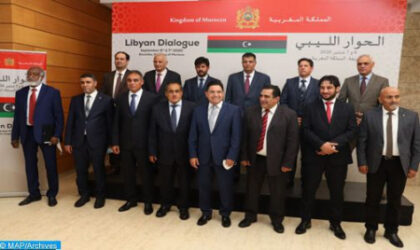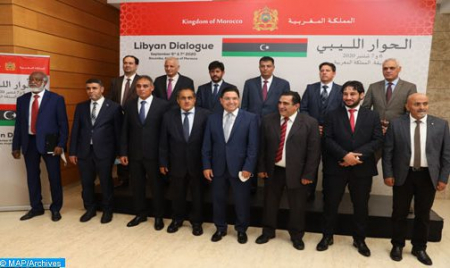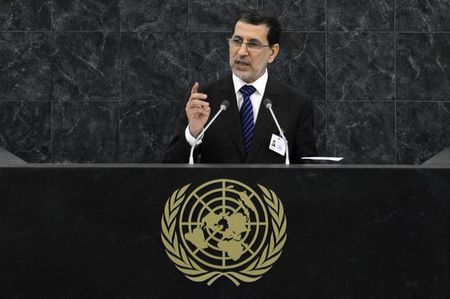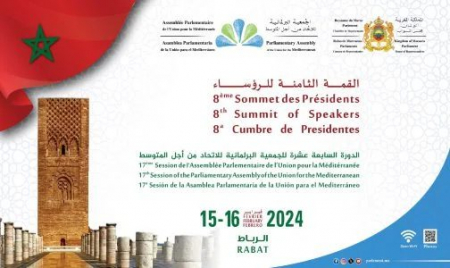 As Moroco is hosting an inter-Libyan dialogue that seeks to foster the recently-decreed ceasefire, build trust between the Libyan parties, and pave the way for a lasting political solution, several international and regional organizations have commended the Kingdom for its active and constructive contribution to a peaceful resolution of the conflict in Libya.
As Moroco is hosting an inter-Libyan dialogue that seeks to foster the recently-decreed ceasefire, build trust between the Libyan parties, and pave the way for a lasting political solution, several international and regional organizations have commended the Kingdom for its active and constructive contribution to a peaceful resolution of the conflict in Libya.
The United Nations on Monday welcomed as “constructive” the role of Morocco, which has contributed since the beginning of the Libyan crisis to efforts to achieve a peaceful resolution of this conflict.
“Since the beginning of the Libyan crisis, the Kingdom of Morocco has played a constructive role and contributed to the UN’s efforts to achieve a peaceful resolution to the Libyan conflict,” said Stéphane Dujarric, spokesperson for the UN Secretary-General.
“The Libyan political agreement signed in 2015 in Skhirat demonstrates Morocco’s firm commitment to find a solution to the Libyan crisis alongside the United Nations,” he said in a statement distributed to the international media accredited to the UN.
“We are convinced that this latest initiative of Morocco will have a positive impact on the facilitation by the UN of the political dialogue owned and led by the Libyans,” the spokesman said.
The UN Secretary General, Antonio Guterres, “supports all initiatives that would help advance and complement the ongoing peace efforts” for the resolution of the Libyan crisis, said his spokesman in reference to the Libyan dialogue that began Sunday in Bouznika between the delegations of the Libyan Parliament and the High Council of State.
In the same vein, the European Union said it is “grateful to Morocco for its active role” in the settlement of the Libyan conflict.
“We are grateful to Morocco for its active role with both parties, in support of the UN-led process,” EU foreign affairs spokesman Peter Stano said Tuesday in Brussels.
“The EU welcomes any initiative aimed at supporting the UN-led mediation process and advancing the resolution of the Libyan conflict through a political process,” he said, reiterating that “the EU will continue to actively support the Libyan people in their aspirations to establish a peaceful, stable and prosperous country”.
The EU High Representative for Foreign Affairs and Security Policy Josep Borrell welcomed, in a tweet posted Tuesday, the Moroccan initiative to host the inter-Libyan dialogue and bring together members of the High State Council and House of Representatives in Bouznika.
This is “a timely contribution to ongoing UN-led efforts. The commitment by both delegations to a peaceful solution to the conflict in Libya is encouraging,” he added.
The African Union also commended the efforts made by Morocco to bring together the Libyan parties in an attempt to relaunch the negotiations process aimed at achieving a political solution.
“I commend the efforts of Morocco in bringing together the representatives of the Parliament and of the Libyan High Council of State in order to re-launch the process of a political solution to the Libyan crisis”, Chairperson of the AU Commission Moussa Faki Mahamat said Monday on Twitter.
He wrote that he “strongly encourages the parties to embark on this path.”
This inter-Libyan meeting, held under the chairmanship of the Moroccan Minister of Foreign Affairs, is part of international efforts, in particular those of the UN, Europe and Morocco, to help thaw relations between Libyan belligerents.
It must be noted that despite obstacles and foreign interference, the Libyan representatives from the West and the East give credit to the Moroccan mediation, which they qualify as neutral.
Morocco’s rational and logical role in the Libyan dossier should thus confirm the conviction of the Libyans that the spirit of the Skhirat Agreement is the model to follow.
A vision shared by the United Nations, the United States and other major stakeholders, which all encourage the parties to discuss the signing of a Skhirate 2 deal.
A vision, which also confirms that Moroccan diplomacy on Libya is active in helping the Libyans and not in dividing them.
The new meeting in Bouznika between Libyan experts comes at a time new negotiations are set to resume shortly in Geneva, following the intensive meetings that Josep Borrell, the commissioner for EU Foreign and Security Policy had with the Libyan Government of National Accord and members of the Governing Council in Tripoli.
And Morocco has just realized a new diplomatic achievement by offering the Libyans space to discuss points of contention dividing them.



